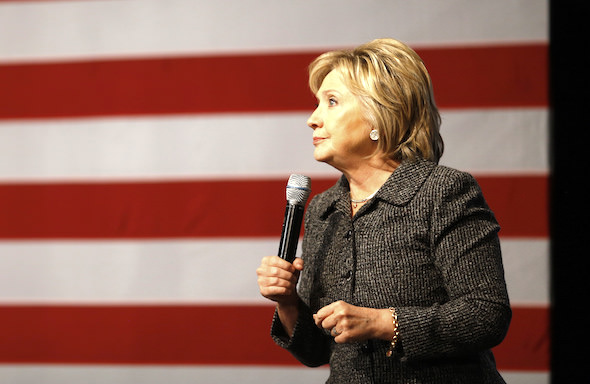How Hillary Clinton Helped Turn Libya Into a ‘Terrorist Haven’ for Islamic State, According to NYT
The second part of The New York Times' investigation into the U.S. approach in Libya is a scathing indictment of the former secretary of state's push for military intervention in the North African country five years ago. Hillary Clinton. (Patrick Semansky / AP)
Hillary Clinton. (Patrick Semansky / AP)
The second part of The New York Times’ investigation into the U.S. approach in Libya is a scathing indictment of former Secretary of State Hillary Clinton’s push for military intervention in the North African country five years ago.
READ ALSO: Hillary the Hawk: NYT Calls Clinton’s Libyan Intervention, and Her Leadership, Into Question
In the piece linked above, journalists Jo Becker and Scott Shane introduced their series as “the story of how a woman whose Senate vote for the Iraq war may have doomed her first presidential campaign” but who “nonetheless doubled down and pushed for military action in another Muslim country.” They gave a detailed outline of Clinton’s decision-making process regarding Libya. The writers also seemed to set up their investigation as a warning to Americans considering voting for presidential candidate Clinton by explaining how her current approach to Syria seems to mimic her disastrous efforts in Libya.
In the follow-up to the first piece, Becker and Shane write that Libyan leader Moammar Gadhafi’s fall seemed like something to put on “a brag sheet for a cabinet member eyeing a presidential race” but soon led to violent disorder in which Clinton was a bystander as “the country dissolved into chaos, leading to a civil war that would destabilize the region, fueling the refugee crisis in Europe and allowing the Islamic State to establish a Libyan haven that the United States is now desperately trying to contain.”
A plethora of readily available weaponry combined with tribal conflicts became a recipe for a civil war in Libya even as the destabilized country “moved quickly off the top of the administration’s agenda.” However, the reporters write, Clinton’s popularity did not wane despite a series of ominous events in Libya, including the 2012 attack on the U.S. diplomatic compound in Benghazi, in which Ambassador J. Christopher Stevens and Foreign Service information management officer Sean Smith were killed.
If the attempt to pin blame for the Benghazi attack on Mrs. Clinton would largely fail, the notion that the Libyan intervention was among her successes had become steadily more threadbare. Libya would not conform, either as cudgel or brag, to the needs of American politics.
As she exited the State Department in February 2013, factional violence, which would break into open civil war in 2014, was on the rise. The flow of refugees paying smugglers for a hazardous trip across the Mediterranean was swelling. And the Libyan chaos would give rise to two rival governments — one backed by Egypt and the United Arab Emirates, the other by Qatar, Turkey and Sudan — providing sanctuary to extremists, soon to be joined by emissaries of the Islamic State.
The weapons that had made it so hard to stabilize Libya were turning up in Syria, Tunisia, Algeria, Mali, Niger, Chad, Nigeria, Somalia, Sudan, Egypt and Gaza, often in the hands of terrorists, insurgents or criminals. … A cynical line would begin to circulate in Washington: In Iraq, the United States had intervened and occupied — and things had gone to hell. In Libya, the United States had intervened but not occupied — and things had gone to hell. And in Syria, the United States had neither intervened nor occupied — and things had still gone to hell.
Read more.
The second piece in the three-part series, which has made Clinton’s crucial role in Libya’s demise clear, ends with a description of how the former secretary of state has attempted to displace her responsibility for the outcomes of America’s Libya venture onto President Obama, even as her determination to go on intervening in the Middle East continues to harden.
— Posted by Natasha Hakimi Zapata
Your support matters…Independent journalism is under threat and overshadowed by heavily funded mainstream media.
You can help level the playing field. Become a member.
Your tax-deductible contribution keeps us digging beneath the headlines to give you thought-provoking, investigative reporting and analysis that unearths what's really happening- without compromise.
Give today to support our courageous, independent journalists.









You need to be a supporter to comment.
There are currently no responses to this article.
Be the first to respond.